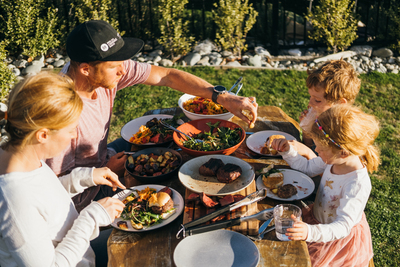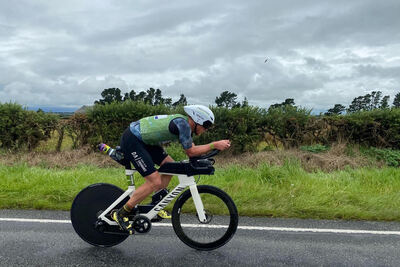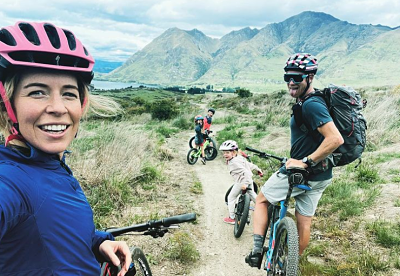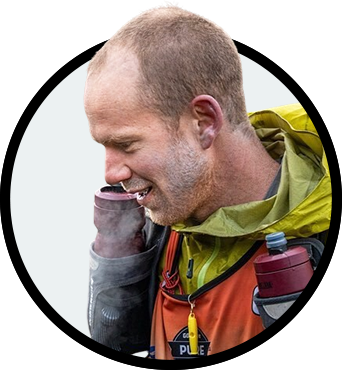As the world ‘re-opens’ and we rediscover a sense of freedom, many of us will start to travel to events again. For many in the Northern Hemisphere in particular, traveling internationally can mean anything from a few hours to a few days of transport and airport layovers.
For me down here in little, old New Zealand, travelling overseas is a rather big commitment, often including at least one long haul flight! So for this reason, alongside the fact I've been travelling internationally to compete in endurance events since 2009 (often with a wife and children in tow), I feel qualified to share some advice on how you can make your next trip one that helps heighten your chances of arriving at your event safe, healthy and ready to go.
The irony is that I'm writing this article from an aeroplane as I embark on my first international trip for a race since 2019. Spending the last week going back through a process that once felt so familiar and now seems so foreign was a handy refresher on how to prepare to travel and race...
1. Prepare
Generally speaking, most of us traveling for events will do so during the taper phase of our training. Consider how our immune system is influenced by training and fatigue and plan your training in a way that allows you to begin your travels with reasonable freshness and vitality, rather than performing long or hard training within close proximity of beginning your trip.
By climbing on an aeroplane with high levels of training fatigue, it's likely we are compromising our immune system’s ability to fight off the bad guys. So, aim to eat healthy foods, be well hydrated and prioritise sleep in the days leading up to your trip.

2. Timezones and sleep
I can safely assume you have followed the news during the past few years, so I can probably skip over the ‘wear a mask’ and ‘wash your hands’ aspects of staying healthy while travelling.
While practicing good hygiene should be a given nowadays, I do think there are other little often overlooked tricks that can help. The main one being sleep habits when traveling between timezones. Considering how important sleep is for recovery, performance and general health, it's no wonder we often find racing after travelling presents more of a challenge than racing at home.
The first tip would be to set your clock and watch to your destination the moment you begin your trip. This is especially important when flying long haul to timezones much different to our origin. Once we set the time to our destination, we can immediately begin thinking and behaving accordingly.
As an example, I will either say yes or no to the coffee offered on board depending on the time of day at my destination. If it's 9am, yes please. If it's 10pm at the place I'm heading to, then I'm more interested in encouraging my brain to sleep, or at least rest. Caffeine and alcohol are going to compromise this, while magnesium and melatonin tablets might help. But when it comes to sleeping, how do we try to achieve this?
If I could boil everything important about falling asleep down to a couple of factors, I would say darkness and quietness are tops. I'll always travel with ear plugs and a face mask for this very reason. If I know the time is right to be sleeping, I will consciously reduce how much stimuli I throw at my brain, pop a neck pillow on, kick back and relax. The screens get turned off and I'll often read a book to help ‘unwind’ before popping my face mask on and sticking my ear plugs in.
A final note on sleeping is to try and reduce your expectations. It certainly won’t help if we feel pressured to sleep ‘because we need to’. Remember that relaxing quietly with our eyes closed so our body and mind are at rest, is still going to be of huge value as we look to reset our body to a new timezone. Falling asleep is a bonus!
3. Move and hydrate
If and when sleep is not the priority while travelling, remember to move often and stay hydrated. I'll try to get up and walk around the aeroplane cabin every hour or two, perhaps even doing a few calf raises to shift the blood around the lower limbs. This helps to reduce the sense of heaviness and tightness that often develops during longer trips.

Hydration is also important as we become less aware of it and we often spend long periods of time in air conditioned areas and aeroplanes where the air is less humid, meaning we're effectively being 'dried out'. It's not just on the race course you’ll see me sipping on my Precision Hydration electrolytes, they accompany me everywhere I go while traveling to and from an event.
4. Arriving
Once you're at your destination, it's important to continue to respect the timezone and make decisions that help you adjust accordingly. Ideally, depending on what time of the day you arrive, you will do your exercise earlier in the day (morning) and rest and relax in the afternoon and evening.
It's well known that the sun affects our circadian clock, so a piece of advice my coach gave me many years ago is to try and wake up with the sunrise the first morning you are at your destination and get outdoors to exercise. For me, this is usually a light jog and walk to help shift the circadian clock as well as gently get the blood flowing through some heavy and tight legs.
As awful as this has often felt initially, I do find it helps fast track my adjustment to the time zone and begin bringing some spring back into my step. As night approaches at the other end of the day, I'll be limiting caffeine and alcohol and doing my best to relax a few hours before bedtime.
5. Parental advice
If you're reading this and picturing how you can achieve these tips while travelling with children, I must bow my head right now and acknowledge that your chances are dramatically reduced.
I remember travelling from New Zealand with my wife and son who was eight months old to an IRONMAN in Canada, then on to an IRONMAN in Sweden in 2015. Mum and Dad's bodies had no idea which way was up, let alone poor little Flynn! He was awake all night and wanted to sleep all day.

The only thing I can say here is that my wife was amazing. She knew well before our trip that the IRONMAN events were a hugely important part of why we were traveling and when Flynn was waking up at midnight in Sweden during race week and wanting to kick the party off, she was taking him for walks in the pram so I could bank a full night of sleep. Fair to say that when the race was finished, it was my turn to step up.
So as a tip, be open and honest with your spouse about your expectations before the race , particularly around sleep and recovery if you're travelling with children. As part of this critical negotiating conference, be sure to pledge your intention to repay the favour after the race so your ally knows it's a two-way deal.
6. Luggage
Having completed many trips with kayak paddles, climbing equipment, multiple helmets, two bikes, prams, car seats and more, I have two parting comments if you're planning on travelling with bikes and other sports equipment...
1. Keep it simple
Pack what you need and not what you don’t. If you're travelling to the tropics, how much clothing do you really need? If you plan to do some pool swimming when you arrive, do you really need fins and hand paddles? If you're traveling to an event where the expo sells Precision Fuel & Hydration, do you leave your 1.5kg bag of PF 30 Gels and PH 1500s at home and purchase it there instead? If you're likely to be tight for space, think carefully about what's essential and what isn’t.
2. Invest in AirTags (or equivalent) to track your luggage
With many airports around the the world understaffed and systems still stumbling their way back from the pandemic, the chances of losing luggage seem higher than they used to be. Attaching an AirTag to your bike case and/or luggage will at least allow you to track where your things are at any given time.
So there we have it. Hopefully when I disembark this flight I can benefit from following through on some of my own advice. While sometimes we need a little luck to travel, stay healthy and perform well, we can certainly help improve our chances.
Good luck out there and travel safe!
